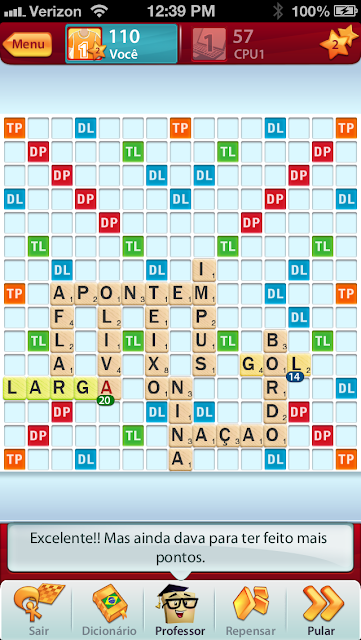English
French
Italian
German
Spanish
Brazilian Portuguese
When the app opens, you go to options where you can select which language you want to use for the menus, and by default, the app will use that same language for the game play.
Features include a Scrabble dictionary in the language you've chosen, as well as instructions and feedback in the same language. This image shows the dictionary, with 2 letter words listed and a place to enter your word:
You can also view the words that have been played so far, along with their point value and a running total:
You can choose to play against the computer, or you can play with others online. If you play against the computer, there are four levels of difficulty from "iniciante" to "perito" which you select, as well as five game types, including "clássico" as well as games of 75 or 150 points, or 8 or 12 rounds.
You also choose whether or not to have the "profesor" monitor your game, as well as "melhor palavra," which gives you up to four "best word" suggestions during the game. This is especially helpful if you're staring at a set of letters and have no clue what to do with them. You can also attempt to play a word that you're not sure about, and if it's wrong, the game will simply inform you that the word doesn't exist in the Scrabble dictionary (it might still be a real word, it just can't be used in Scrabble). There is no penalty and no limit on attempting to play words, unlike in real-life game-play.
The "profesor" will give you feedback about the word you have just played. In this case, I played "gol," which the teacher said was "excelente," but then showed me how I could have earned more points by playing "larga" instead:
For Brazilian Portuguese, "ç" is the only letter that differs from the English alphabet, so you can play the letter "a", for example, as "a", "á", "à", "â", or "ã".
The iPhone app is $1.99, and the HD iPad app costs $4.99 (prices as of Monday, May 27, 2013). The game is available from iTunes.
Playing Scrabble is not the best way to acquire a basic vocabulary of high-frequency words, of course, but it's a fun way to flex your language skills.
What I found as I played was that the game really made me do a lot of active thinking in Portuguese. I found that I worked to come up with a word, even if I wasn't sure of its meaning, that sounded like Portuguese, or that fit with what I already know about Portuguese word patterns. For all the times that learners have cursed the seemingly endless verb forms associated with every Portuguese infinitive, this is a big advantage when playing Scrabble.
If you've played a lot of Scrabble in English, you'll also have to re-think the frequently used strategy of making almost any noun plural by just adding an "s". This works with many Portuguese words, of course, but there are also many words whose plural form includes other changes.
You'll also have to forget most of the 2-letter English words that you've committed to memory, as they won't work in Portuguese.
My verdict: Scrabble on the iOS platform is a relaxing way to immerse yourself in another language, and if you get tired of playing in Portuguese, you can always try another language.





No comments:
Post a Comment